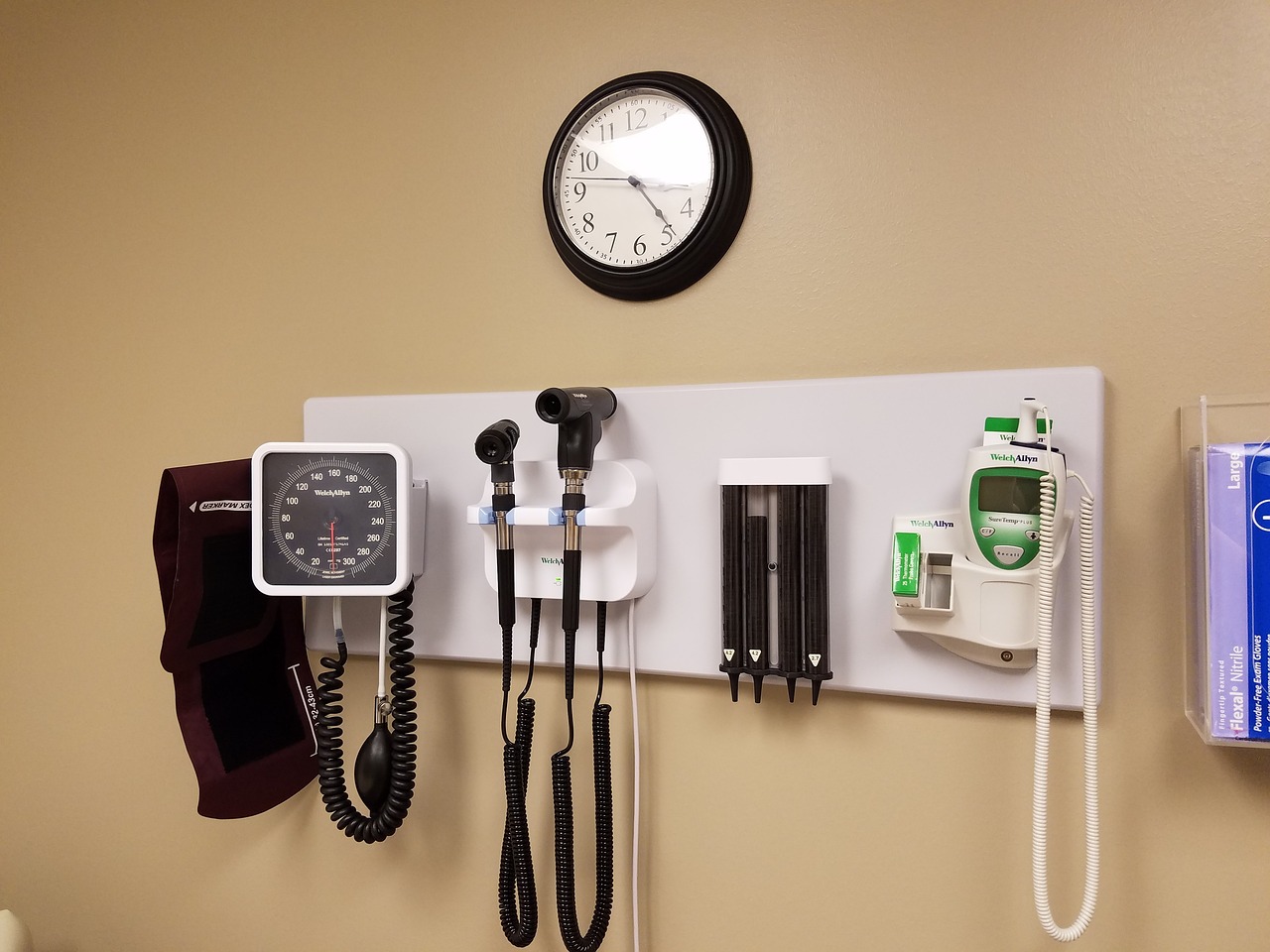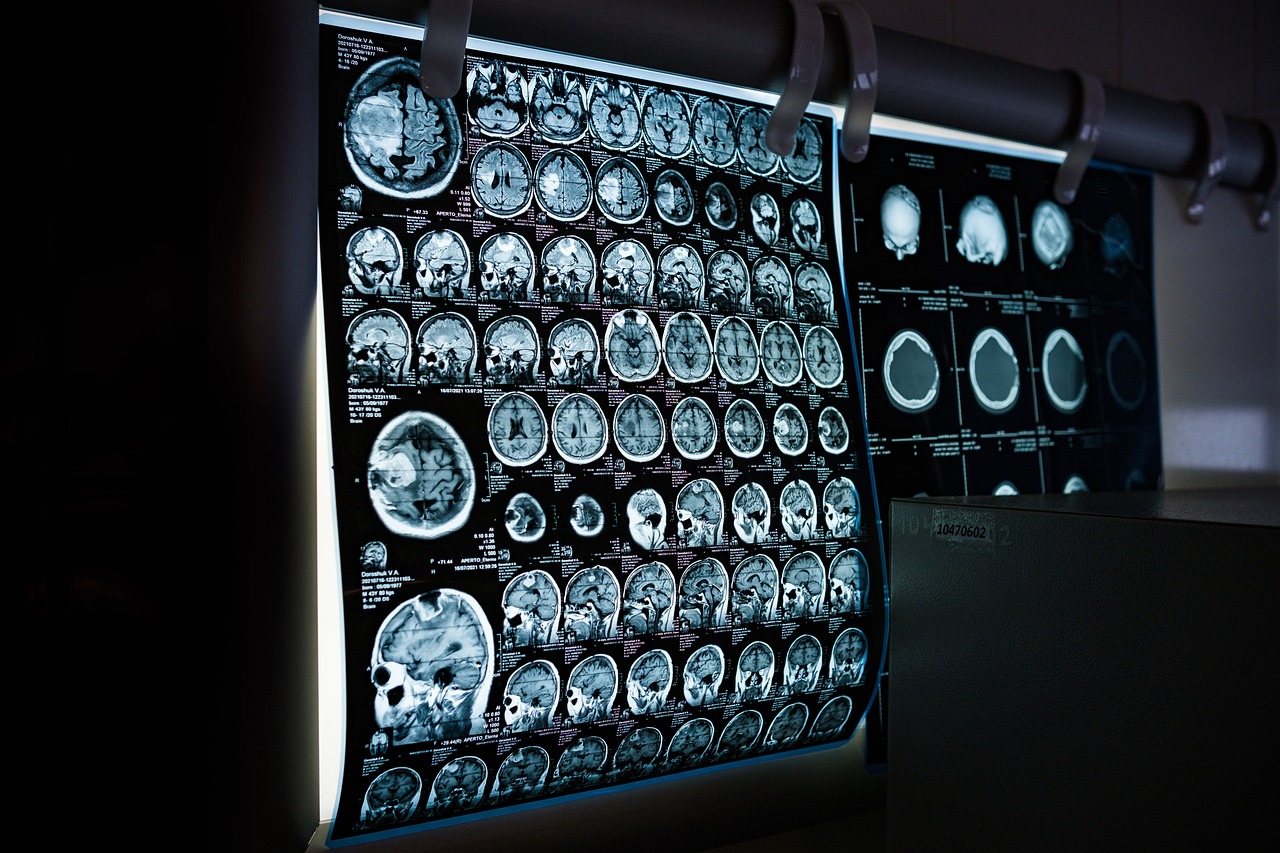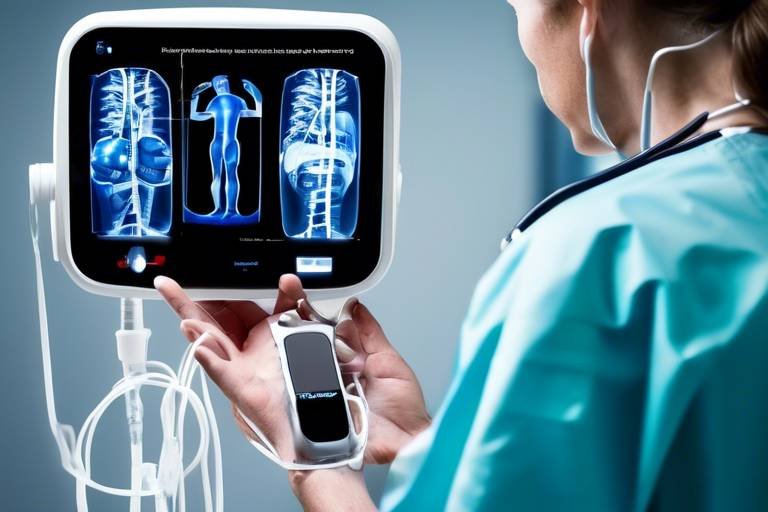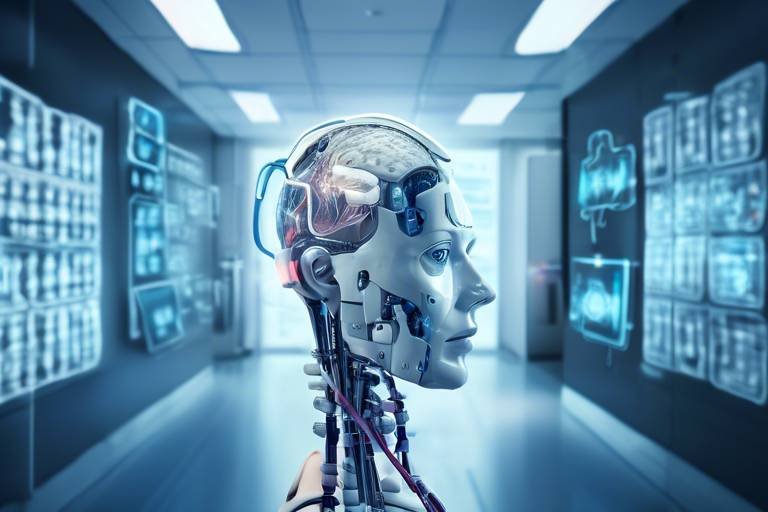Artificial Intelligence: A New Aid in Healthcare
In recent years, artificial intelligence (AI) has emerged as a groundbreaking force in the healthcare sector, revolutionizing how we approach patient care and medical processes. Imagine walking into a doctor's office where technology not only assists but enhances the entire experience—from diagnosis to treatment plans. It's not just a futuristic dream; it's happening right now! AI is transforming healthcare by providing tools that improve accuracy, efficiency, and personalization in medical care.
At its core, AI leverages vast amounts of data to inform decisions, enabling healthcare professionals to make more precise diagnoses and treatment plans. This technology can analyze medical images, patient histories, and even genetic information at lightning speed, offering insights that were previously unimaginable. As we delve deeper into this topic, we will explore how AI enhances diagnostic accuracy, streamlines administrative tasks, and personalizes treatment plans. Additionally, we will touch on the challenges and ethical considerations that accompany this technological evolution.
As we navigate the complexities of AI in healthcare, it's essential to recognize its potential to not only improve patient outcomes but also to streamline operations within healthcare facilities. By automating mundane tasks, AI allows healthcare providers to focus more on what truly matters—caring for patients. This article will shed light on the myriad ways AI is reshaping the healthcare landscape, making it a thrilling time to be involved in this field.
AI algorithms significantly improve diagnostic accuracy by analyzing medical images and patient data, enabling healthcare professionals to detect diseases earlier and more reliably. For instance, AI can assist radiologists in identifying abnormalities in X-rays or MRIs that might be missed by the human eye. This capability not only speeds up the diagnostic process but also enhances the overall reliability of results.
One of the most time-consuming aspects of healthcare is the administrative burden. AI tools automate administrative tasks such as scheduling and billing, allowing healthcare providers to focus more on patient care and less on paperwork. Imagine a world where appointment scheduling is as easy as a few clicks, and billing errors are a thing of the past. This is the promise of AI in healthcare.
With the help of AI, healthcare providers can develop personalized treatment plans based on individual patient data. This leads to more effective and tailored healthcare solutions. For example, AI can analyze a patient’s genetic makeup, lifestyle, and medical history to recommend the most suitable treatment options. This level of personalization not only improves patient outcomes but also enhances patient satisfaction.
Predictive analytics powered by AI can forecast patient outcomes, helping clinicians make informed decisions and intervene proactively to prevent complications. By analyzing trends and patterns in patient data, AI can identify which patients are at risk of developing certain conditions, enabling early intervention and better management strategies.
AI can assist in risk stratification, identifying patients at higher risk for certain conditions. This allows healthcare providers to implement targeted interventions, ensuring that those who need it most receive timely care. For instance, patients with chronic illnesses can be monitored more closely, reducing the likelihood of hospital readmissions.
AI supports population health management by analyzing data trends, helping healthcare systems address community health needs and allocate resources effectively. By understanding the health trends within a community, providers can develop targeted health initiatives that improve overall public health.
AI is revolutionizing drug discovery by analyzing vast datasets to identify potential drug candidates more quickly and efficiently, expediting the development process. This technology can simulate how different compounds interact with biological systems, significantly reducing the time and cost associated with traditional drug discovery methods.
Despite its benefits, the integration of AI in healthcare raises several challenges, including data privacy concerns, algorithmic bias, and the need for regulatory frameworks. As we embrace this technology, it’s crucial to address these challenges to ensure that AI serves as a force for good in healthcare.
Ensuring patient data privacy and security is paramount as AI systems require access to sensitive health information. Robust safeguards and compliance with regulations are necessary to protect patient information. The healthcare industry must prioritize data security to maintain trust and safeguard patient rights.
Algorithmic bias can lead to disparities in healthcare outcomes; therefore, it is critical to develop fair and unbiased AI systems that represent diverse patient populations. Continuous monitoring and evaluation of AI systems are essential to identify and mitigate biases, ensuring equitable healthcare for all.
- What is artificial intelligence in healthcare?
AI in healthcare refers to the use of algorithms and software to analyze complex medical data, assisting in diagnosis, treatment planning, and patient management. - How does AI improve diagnostic accuracy?
AI algorithms can analyze medical images and patient data more quickly and accurately than humans, helping to detect diseases at earlier stages. - What are the ethical concerns surrounding AI in healthcare?
Key concerns include data privacy, algorithmic bias, and the need for regulatory frameworks to ensure patient safety and equitable care.

Enhancing Diagnostic Accuracy
In the ever-evolving landscape of healthcare, diagnostic accuracy is paramount. Imagine a world where diseases can be detected at their earliest stages, significantly improving patient outcomes and survival rates. This is where artificial intelligence (AI) steps in as a game changer. By harnessing the power of AI algorithms, healthcare professionals can analyze medical images and patient data with unprecedented precision. These algorithms are designed to sift through vast amounts of information, identifying patterns and anomalies that might be missed by the human eye.
For instance, AI can process medical imaging data, such as X-rays, MRIs, and CT scans, to detect conditions like tumors or fractures. This technology not only enhances the accuracy of diagnoses but also speeds up the process, allowing doctors to make quicker, more informed decisions. In fact, studies have shown that AI can outperform human radiologists in certain diagnostic tasks, leading to earlier interventions and better patient care.
Furthermore, the integration of AI into diagnostic processes is not limited to imaging. It extends to analyzing patient history, laboratory results, and even genetic information. By compiling and interpreting this data, AI can help identify risk factors for various diseases, paving the way for preventive measures that can be implemented before symptoms even arise. This proactive approach is akin to having a personal health assistant that not only reminds you of your appointments but also predicts potential health issues based on your unique profile.
To illustrate the impact of AI on diagnostic accuracy, consider the following table that summarizes some key benefits:
| Benefit | Description |
|---|---|
| Early Detection | AI algorithms can identify diseases at earlier stages, potentially saving lives. |
| Increased Efficiency | AI processes data faster than human professionals, reducing wait times for diagnoses. |
| Pattern Recognition | AI identifies complex patterns in data that may be overlooked by clinicians. |
| Cost-Effectiveness | By improving accuracy, AI can help reduce unnecessary tests and procedures, saving costs. |
However, while the benefits of AI in enhancing diagnostic accuracy are substantial, it is essential to approach this technology with caution. The reliance on algorithms raises questions about trust and accountability. Are we ready to trust machines with our health? As we integrate AI into our diagnostic processes, ongoing training and validation of these systems are crucial to ensure they perform accurately across diverse populations and conditions.
In conclusion, the role of AI in enhancing diagnostic accuracy is transformative. By leveraging advanced algorithms to analyze complex medical data, healthcare providers can not only improve their diagnostic capabilities but also provide a higher standard of care to their patients. As we continue to explore the potential of AI in healthcare, the focus must remain on ethical considerations and the importance of human oversight to ensure that technology serves as a true partner in patient care.

Streamlining Administrative Tasks
In the bustling world of healthcare, where every second counts, administrative tasks can often feel like a heavy burden. Imagine a scenario where a healthcare provider spends more time managing paperwork than actually caring for patients. This is where artificial intelligence steps in, transforming the landscape of administrative duties with remarkable efficiency. By automating routine tasks, AI not only reduces the workload for healthcare professionals but also enhances overall productivity.
One of the most significant advantages of AI in streamlining administrative tasks is its ability to handle scheduling. Traditional scheduling methods can be cumbersome and prone to errors, leading to missed appointments and frustrated patients. AI-driven scheduling systems are capable of analyzing various factors, such as provider availability, patient preferences, and even historical data on appointment no-shows. This means that AI can optimize schedules in real-time, ensuring that healthcare providers see more patients without compromising the quality of care.
Furthermore, billing and claims processing can be a labyrinth of complexities, often resulting in delays and disputes. AI simplifies this process by automating billing tasks, verifying insurance eligibility, and even flagging discrepancies before they become issues. This not only speeds up the revenue cycle but also minimizes the chances of human error. As a result, healthcare organizations can focus more on delivering exceptional patient care rather than getting bogged down in administrative red tape.
To illustrate the impact of AI on administrative efficiency, consider the following table that highlights key areas of improvement:
| Administrative Task | Traditional Approach | AI-Enhanced Approach |
|---|---|---|
| Appointment Scheduling | Manual entry, high error rate | Automated optimization, real-time adjustments |
| Billing and Claims | Lengthy processing times | Rapid automation, error detection |
| Patient Follow-Up | Phone calls and manual reminders | Automated reminders via SMS or email |
Moreover, AI tools can assist in patient follow-up and engagement. Automated reminders sent through text messages or emails can significantly reduce no-show rates and keep patients informed about their health. This proactive approach not only enhances patient satisfaction but also ensures better health outcomes, as patients are more likely to adhere to treatment plans and follow-up appointments.
In essence, the integration of AI in administrative tasks is akin to having a personal assistant that never tires and always strives for perfection. By freeing healthcare providers from mundane tasks, AI allows them to dedicate more time to their patients, fostering a deeper connection and improving the overall healthcare experience. As we continue to embrace these technological advancements, the future of healthcare looks brighter, with a focus on patient-centered care.
- How does AI improve scheduling in healthcare? AI analyzes multiple factors to optimize appointment schedules, reducing errors and enhancing patient flow.
- What are the benefits of AI in billing? AI automates billing processes, speeds up claims processing, and minimizes human errors, leading to better financial outcomes for healthcare providers.
- Can AI help in patient engagement? Yes, AI tools can send automated reminders and follow-ups, improving patient adherence to treatment plans and appointments.

Personalized Treatment Plans
In the ever-evolving landscape of healthcare, the concept of has emerged as a beacon of hope for patients and providers alike. Imagine a world where your treatment is not just a one-size-fits-all approach, but rather a tailored strategy designed specifically for you. With the power of artificial intelligence (AI), this dream is becoming a reality. AI enables healthcare providers to analyze vast amounts of patient data, including genetic information, lifestyle factors, and medical history, to create treatment plans that are as unique as each individual.
The beauty of personalized treatment lies in its ability to enhance the effectiveness of medical interventions. For instance, consider how cancer treatments can vary significantly from one patient to another. By leveraging AI algorithms, oncologists can identify the most effective therapies based on a patient's specific tumor characteristics and genetic profile. This not only increases the likelihood of successful outcomes but also minimizes the risk of adverse side effects.
Moreover, the integration of AI in developing personalized treatment plans allows for a more dynamic approach to patient care. As new data becomes available—whether through ongoing research or real-time monitoring of a patient's condition—healthcare providers can adjust treatment strategies accordingly. This level of adaptability is crucial in managing chronic diseases, where patient conditions can fluctuate dramatically.
To illustrate the impact of personalized treatment plans, consider the following table that outlines various factors influencing treatment customization:
| Factor | Description |
|---|---|
| Genetic Information | Understanding a patient's genetic makeup to predict responses to specific treatments. |
| Medical History | Analyzing past treatments and their outcomes to inform future decisions. |
| Lifestyle Factors | Considering diet, exercise, and other lifestyle choices that affect health. |
| Real-time Monitoring | Using wearable technology to gather data on patient health continuously. |
As we delve deeper into the realm of personalized medicine, it becomes evident that patient engagement is a key component of success. Patients who are actively involved in their treatment decisions tend to have better outcomes. AI can facilitate this engagement by providing patients with understandable insights into their health data and treatment options. Imagine receiving personalized recommendations directly on your smartphone, empowering you to take charge of your health journey.
In conclusion, the advent of AI in healthcare heralds a new era of personalized treatment plans that promise to revolutionize patient care. By harnessing the power of data, healthcare providers can create tailored strategies that not only improve outcomes but also enhance the overall patient experience. The future of medicine is not just about treating diseases; it's about understanding individuals and crafting solutions that resonate with their unique needs.
- What are personalized treatment plans?
Personalized treatment plans are customized healthcare strategies developed based on an individual's unique medical history, genetic makeup, and lifestyle factors.
- How does AI contribute to personalized medicine?
AI analyzes vast datasets to identify patterns and insights that help healthcare providers create tailored treatment plans for patients.
- Can personalized treatment plans improve patient outcomes?
Yes, personalized treatment plans have been shown to enhance treatment effectiveness and reduce the risk of adverse effects.
- What role do patients play in personalized treatment?
Patients are encouraged to engage actively in their treatment decisions, which can lead to better health outcomes.

Predictive Analytics in Patient Care
Predictive analytics in patient care is like having a crystal ball that allows healthcare providers to foresee potential health issues before they escalate. By leveraging the power of artificial intelligence and vast amounts of patient data, clinicians can make informed decisions that ultimately lead to better patient outcomes. Imagine walking into a doctor's office and knowing that your physician has already analyzed your health history, lifestyle choices, and even genetic predispositions to predict your future health risks. This is the kind of transformative power that predictive analytics brings to the table.
At its core, predictive analytics involves the use of statistical algorithms and machine learning techniques to identify patterns and trends in data. For instance, if a patient has a family history of diabetes, AI algorithms can analyze their current health metrics—such as blood sugar levels, body mass index, and activity levels—to forecast the likelihood of developing the condition. This proactive approach enables healthcare providers to intervene early, implementing lifestyle changes or preventive measures that can significantly alter the patient's health trajectory.
One of the most exciting aspects of predictive analytics is its ability to continuously learn and adapt. The more data these systems process, the more accurate their predictions become. For example, by analyzing data from thousands of patients, AI can identify subtle indicators of deteriorating health that might escape even the most experienced clinician. This capability not only enhances diagnostic precision but also empowers patients to take charge of their health by providing them with personalized insights and recommendations.
However, the implementation of predictive analytics is not without its challenges. The accuracy of predictions relies heavily on the quality of the data being analyzed. If the data is incomplete or biased, the resulting predictions may lead to incorrect conclusions. Therefore, healthcare organizations must prioritize data quality and ensure that their AI systems are trained on diverse and representative datasets to mitigate risks associated with algorithmic bias.
In summary, predictive analytics in patient care represents a significant leap forward in how healthcare is delivered. By anticipating health issues before they arise, healthcare providers can offer more personalized and effective care, ultimately leading to improved patient outcomes. As we continue to embrace this technology, the future of healthcare looks not only promising but also profoundly more efficient and responsive to individual patient needs.
- What is predictive analytics in healthcare? - Predictive analytics involves using data analysis techniques to predict future health outcomes based on historical data.
- How does AI enhance predictive analytics? - AI algorithms can analyze vast amounts of data quickly and identify patterns that humans might miss, leading to more accurate predictions.
- What are the challenges of implementing predictive analytics? - Key challenges include ensuring data quality, addressing algorithmic bias, and maintaining patient privacy.
- Can predictive analytics improve patient outcomes? - Yes, by allowing for early intervention and personalized care, predictive analytics can significantly enhance patient outcomes.

Risk Stratification
Risk stratification is a game-changer in the healthcare landscape, allowing providers to identify patients who are at a higher risk for certain medical conditions. Imagine being able to predict who might need more intensive care or who is at a greater risk for complications before they even occur. This proactive approach not only improves patient outcomes but also optimizes resource allocation within healthcare systems. By leveraging artificial intelligence (AI), healthcare professionals can analyze vast amounts of patient data, including demographics, medical history, and lifestyle factors, to categorize patients based on their risk levels.
For instance, AI algorithms can sift through electronic health records (EHRs) to uncover patterns that may not be immediately obvious to human eyes. This is akin to finding a needle in a haystack; while it’s possible, it’s often time-consuming and fraught with potential errors. AI, however, can scan through thousands of records in mere seconds, identifying those who might benefit from early intervention. The result? A healthcare system that is not only more efficient but also more effective in its approach to patient care.
Furthermore, risk stratification can significantly enhance clinical decision-making. By understanding which patients are at higher risk for conditions such as diabetes, heart disease, or respiratory issues, healthcare providers can tailor their interventions accordingly. For example, a patient identified as high risk for heart disease might receive more frequent check-ups, personalized lifestyle advice, or even early medication to manage their condition. This targeted approach ensures that resources are used wisely and that patients receive the care they need when they need it.
To illustrate the effectiveness of risk stratification, consider the following table that outlines typical risk factors and associated conditions:
| Risk Factor | Associated Condition |
|---|---|
| High Blood Pressure | Heart Disease |
| Obesity | Type 2 Diabetes |
| Smoking | Respiratory Diseases |
| Family History | Certain Cancers |
Moreover, the integration of AI in risk stratification doesn't just benefit individual patients; it also has a ripple effect on population health. By analyzing data trends across different demographics, healthcare systems can identify broader health risks within communities. This insight allows for the development of targeted public health initiatives aimed at reducing the prevalence of chronic diseases. For example, if a particular region shows a high incidence of obesity-related conditions, healthcare providers can implement community programs focused on nutrition and exercise to combat this trend.
In conclusion, risk stratification powered by AI is not merely a technological advancement; it is a fundamental shift in how we approach healthcare. By identifying at-risk populations and tailoring interventions accordingly, we can move towards a more personalized and preventative model of care. This not only enhances patient outcomes but also contributes to the overall efficiency of healthcare systems, making it a win-win for everyone involved.
- What is risk stratification? Risk stratification is the process of categorizing patients based on their likelihood of developing certain health conditions, allowing for targeted interventions.
- How does AI improve risk stratification? AI analyzes large datasets quickly and accurately, identifying patterns and risk factors that may not be visible through traditional methods.
- Why is risk stratification important? It enables healthcare providers to focus resources on patients who need it most, improving overall health outcomes and reducing healthcare costs.

Population Health Management
Population health management is a crucial aspect of modern healthcare that focuses on improving the health outcomes of a group of individuals, often within a specific geographic area or demographic. With the integration of artificial intelligence (AI), healthcare providers can analyze vast amounts of data to identify trends and patterns that may not be immediately apparent. This capability allows for a more effective approach to managing the health of populations, ultimately leading to better health outcomes and optimized resource allocation.
Imagine a community where healthcare providers can predict outbreaks of diseases before they happen, or where they can identify which populations are at higher risk for chronic conditions. This is the power of AI in population health management. By utilizing data from various sources such as electronic health records, social determinants of health, and even wearable technology, AI can help healthcare professionals make informed decisions. For instance, AI algorithms can analyze historical data to forecast the prevalence of diseases like diabetes or hypertension, enabling targeted interventions.
Moreover, AI can assist in segmenting populations based on various risk factors, which allows for tailored health programs. For example, a healthcare system might use AI to identify a group of elderly patients with multiple chronic conditions and develop a specialized care plan that addresses their unique needs. This not only enhances patient care but also reduces healthcare costs by preventing complications that arise from unmanaged health conditions.
To illustrate the impact of AI on population health management, consider the following table that outlines key benefits:
| Benefit | Description |
|---|---|
| Early Detection | AI can analyze trends in health data to identify potential health issues before they become critical. |
| Resource Allocation | By understanding community health needs, healthcare providers can allocate resources more efficiently. |
| Improved Patient Engagement | AI tools can facilitate communication between patients and providers, making it easier for individuals to engage in their health management. |
| Cost Reduction | Preventive measures driven by AI insights can significantly reduce long-term healthcare costs. |
As we delve deeper into the future of healthcare, the role of AI in population health management will only continue to expand. With the ongoing advancements in technology, we can expect to see even more innovative solutions that address the complex challenges faced by healthcare systems today. The potential for AI to enhance community health is immense, and as we harness this technology, the ultimate goal remains: to ensure that every individual has access to the care they need, when they need it.
- What is population health management?
Population health management is a strategy that aims to improve the health outcomes of a specific group of individuals by analyzing data and implementing targeted interventions.
- How does AI contribute to population health management?
AI contributes by analyzing large datasets to identify health trends, predict disease outbreaks, and tailor healthcare programs to meet the needs of specific populations.
- What are the benefits of using AI in healthcare?
Benefits include improved diagnostic accuracy, streamlined administrative tasks, personalized treatment plans, and enhanced population health management.
- What challenges does AI face in healthcare?
Challenges include data privacy concerns, algorithmic bias, and the need for robust regulatory frameworks to ensure ethical use of AI technologies.

AI in Drug Discovery
Artificial Intelligence is not just a buzzword; it’s a game changer in the realm of drug discovery. Traditionally, discovering new drugs has been a lengthy and expensive process, often taking over a decade and costing billions of dollars. However, with the advent of AI technologies, this process is undergoing a radical transformation. Imagine being able to sift through millions of chemical compounds in a fraction of the time it would take a human researcher. That’s the power of AI!
AI systems utilize advanced algorithms to analyze vast datasets, identifying potential drug candidates more quickly and efficiently than ever before. For instance, machine learning models can predict how different compounds will interact with biological targets, significantly reducing the time spent on trial and error. This predictive capability not only accelerates the discovery process but also enhances the likelihood of success in clinical trials.
One of the most exciting aspects of AI in drug discovery is its ability to uncover new uses for existing medications. This approach, known as drug repurposing, can lead to breakthroughs in treating diseases that have few available treatment options. For example, AI can analyze data from various sources, including clinical trials and patient records, to suggest that a drug initially developed for one condition might be effective for another entirely different disease.
Let’s take a closer look at some of the ways AI is revolutionizing drug discovery:
- Data Mining: AI algorithms can analyze published research, clinical trial data, and even social media to find patterns and insights that human researchers might miss.
- High-Throughput Screening: AI can automate the screening of thousands of compounds against biological targets, identifying promising candidates faster than traditional methods.
- Predictive Modeling: By using historical data, AI can predict how new compounds will behave in biological systems, helping to prioritize the most promising candidates for further testing.
Moreover, AI can help in designing clinical trials by identifying suitable patient populations and optimizing trial protocols. This not only improves the chances of success but also ensures that trials are conducted more efficiently. Imagine if we could tailor clinical trials to the specific genetic makeup of patients—this is the future that AI is paving the way for!
However, while the benefits of AI in drug discovery are immense, it’s essential to approach this technology with caution. The reliance on algorithms means that the quality of the data fed into these systems is crucial. Poor data can lead to misleading results, which can have dire consequences in the healthcare sector. Therefore, continuous monitoring and validation of AI systems are necessary to ensure their reliability and effectiveness.
In summary, AI is not just enhancing the speed and efficiency of drug discovery; it’s also opening up new avenues for innovation in treating diseases. By leveraging the power of AI, researchers can focus on what truly matters—developing life-saving therapies that can improve patient outcomes. The future of drug discovery is bright, and AI is at the forefront of this exciting evolution.
Q1: How does AI improve the drug discovery process?
AI improves drug discovery by analyzing large datasets to identify potential drug candidates more quickly and accurately than traditional methods.
Q2: Can AI help in repurposing existing drugs?
Yes, AI can analyze data to find new uses for existing medications, which can expedite treatment options for various diseases.
Q3: What are the challenges of using AI in drug discovery?
Challenges include ensuring data quality, addressing algorithmic bias, and the need for regulatory compliance in clinical settings.

Challenges and Ethical Considerations
As we embrace the remarkable advancements of artificial intelligence in healthcare, it’s crucial to acknowledge the challenges and ethical considerations that accompany this transformative technology. While AI holds the potential to revolutionize patient care and streamline processes, the integration of these systems is not without its hurdles. One of the primary concerns revolves around data privacy and security. AI systems rely on vast amounts of sensitive health information to function effectively. This raises significant questions about how patient data is handled, stored, and protected. Healthcare providers must implement robust safeguards to ensure compliance with regulations like HIPAA, and to maintain patient trust.
Another pressing issue is algorithmic bias. AI systems are only as good as the data they are trained on. If the datasets used to develop these algorithms lack diversity, the resulting AI can perpetuate existing disparities in healthcare outcomes. For instance, if a system is primarily trained on data from a specific demographic, it may not perform as well for patients outside that group. This is why it is essential to focus on creating fair and unbiased AI systems that accurately represent diverse patient populations.
Moreover, the need for regulatory frameworks comes into play. As AI technologies evolve, so too must the laws and guidelines governing their use in healthcare. Policymakers face the daunting task of balancing innovation with patient safety and ethical considerations. Establishing clear regulations will help mitigate risks while promoting the responsible integration of AI into healthcare practices.
In summary, while the potential for AI in healthcare is vast, addressing these challenges is vital to ensure that its benefits are realized equitably. Stakeholders must work collaboratively to create solutions that prioritize patient privacy, eliminate bias, and establish a solid regulatory foundation for AI technologies.
- What are the main challenges of integrating AI in healthcare? The main challenges include data privacy and security concerns, algorithmic bias, and the need for effective regulatory frameworks.
- How can healthcare providers ensure data privacy? By implementing robust safeguards, complying with regulations like HIPAA, and regularly auditing their data practices.
- Why is addressing algorithmic bias important? To prevent disparities in healthcare outcomes and ensure that AI systems work effectively for all patient demographics.
- What role do regulations play in AI healthcare integration? Regulations help ensure patient safety, promote ethical practices, and provide guidelines for the responsible use of AI technologies.

Data Privacy and Security
This article explores the transformative role of artificial intelligence in healthcare, highlighting its benefits, challenges, and future potential in improving patient outcomes and streamlining medical processes.
AI algorithms significantly improve diagnostic accuracy by analyzing medical images and patient data, enabling healthcare professionals to detect diseases earlier and more reliably.
AI tools automate administrative tasks such as scheduling and billing, allowing healthcare providers to focus more on patient care and less on paperwork.
With the help of AI, healthcare providers can develop personalized treatment plans based on individual patient data, leading to more effective and tailored healthcare solutions.
Predictive analytics powered by AI can forecast patient outcomes, helping clinicians make informed decisions and intervene proactively to prevent complications.
AI can assist in risk stratification, identifying patients at higher risk for certain conditions, enabling targeted interventions and improved management strategies.
AI supports population health management by analyzing data trends, helping healthcare systems address community health needs and allocate resources effectively.
AI is revolutionizing drug discovery by analyzing vast datasets to identify potential drug candidates more quickly and efficiently, expediting the development process.
Despite its benefits, the integration of AI in healthcare raises several challenges, including data privacy concerns, algorithmic bias, and the need for regulatory frameworks.
Ensuring patient data privacy and security is paramount as AI systems require access to sensitive health information. The collection, storage, and processing of this data can create significant vulnerabilities if not managed properly. Healthcare organizations must implement robust safeguards to protect patient information from breaches and unauthorized access.
To illustrate the importance of these measures, consider the following:
| Data Privacy Risks | Potential Consequences |
|---|---|
| Data Breaches | Loss of patient trust, legal repercussions, and financial penalties |
| Unauthorized Access | Compromised patient safety and privacy violations |
| Inadequate Compliance | Fines and sanctions from regulatory bodies |
Moreover, compliance with regulations such as HIPAA (Health Insurance Portability and Accountability Act) in the United States is critical. This legislation mandates strict guidelines on how patient data should be handled, ensuring that individuals' health information remains confidential. Non-compliance can lead to severe penalties, making it essential for healthcare organizations to prioritize data security.
In addition to technical measures, fostering a culture of awareness and responsibility among healthcare professionals is vital. Regular training and updates on data privacy practices can empower staff to recognize potential threats and act accordingly. Ultimately, the goal is to create an environment where patient data is not only protected but also respected.
Algorithmic bias can lead to disparities in healthcare outcomes; therefore, it is critical to develop fair and unbiased AI systems that represent diverse patient populations.
- What is AI in healthcare? AI in healthcare refers to the use of artificial intelligence technologies to analyze data, assist in diagnostics, and improve patient care.
- How does AI improve diagnostic accuracy? AI algorithms analyze medical images and patient data to identify patterns that may be missed by human eyes, leading to earlier and more accurate diagnoses.
- What are the privacy concerns with AI in healthcare? The main concerns include data breaches, unauthorized access to sensitive information, and compliance with regulations protecting patient data.
- Can AI lead to biased healthcare outcomes? Yes, if AI systems are trained on biased data, they can perpetuate existing disparities in healthcare, making it essential to ensure diversity in training datasets.

Addressing Algorithmic Bias
Algorithmic bias is a pressing issue in the realm of artificial intelligence, especially in healthcare. Imagine a scenario where a diagnostic tool consistently misidentifies conditions in certain demographic groups due to skewed training data. This isn't just a hypothetical situation; it can lead to significant disparities in healthcare outcomes. The crux of the problem lies in the datasets used to train these AI systems. If the data is not representative of the entire population, the algorithms may develop a biased understanding of health conditions, ultimately affecting the quality of care provided to underrepresented groups.
To tackle this challenge, it is crucial for developers and healthcare professionals to adopt a multifaceted approach. First and foremost, they need to ensure that the data used for training AI models is diverse and inclusive. This means incorporating a wide range of patient demographics, including age, gender, ethnicity, and socioeconomic status. By doing so, the AI systems can learn from a more comprehensive set of examples, thus reducing the likelihood of bias.
Moreover, ongoing monitoring of AI performance is essential. Just like a car needs regular maintenance to run smoothly, AI systems require continual evaluation to ensure they are functioning as intended. This includes analyzing the outcomes produced by the AI in real-world settings and adjusting the algorithms as necessary. If a particular demographic is consistently receiving subpar results, it should trigger an immediate review of the underlying data and algorithm.
Another effective strategy is to involve a diverse group of stakeholders in the development process. By bringing together healthcare professionals, ethicists, data scientists, and representatives from various communities, the AI systems can be designed with a broader perspective. This collaborative approach can help identify potential biases early on and create solutions that are more equitable.
In addition to these strategies, transparency plays a vital role in addressing algorithmic bias. Developers should be open about how their AI systems work, including the data sources used and the decision-making processes involved. This transparency fosters trust among patients and healthcare providers, encouraging them to engage with AI technologies more confidently. Furthermore, regulatory frameworks should be established to hold AI systems accountable, ensuring that they meet ethical standards and do not perpetuate existing disparities in healthcare.
Ultimately, addressing algorithmic bias in AI is not just a technical challenge; it's a moral imperative. By prioritizing fairness and equity in the development and deployment of AI technologies, we can ensure that these powerful tools enhance healthcare for everyone, rather than exacerbate existing inequalities. The journey toward unbiased AI is ongoing, and it requires commitment from all stakeholders involved.
- What is algorithmic bias?
Algorithmic bias refers to systematic and unfair discrimination that can occur in AI systems, often due to biased training data or flawed algorithms. - Why is addressing algorithmic bias important in healthcare?
Addressing algorithmic bias is crucial to ensure that all patients receive equitable care and that AI technologies do not worsen existing health disparities. - How can we reduce algorithmic bias in AI?
Reducing algorithmic bias involves using diverse training data, continuous monitoring of AI performance, involving diverse stakeholders in development, and ensuring transparency in AI systems.
Frequently Asked Questions
- What is the role of AI in enhancing diagnostic accuracy?
AI plays a crucial role in enhancing diagnostic accuracy by analyzing medical images and patient data. This technology enables healthcare professionals to detect diseases earlier and more reliably, leading to better patient outcomes. Imagine having a super-smart assistant that can sift through tons of information in seconds, picking up patterns that even the best doctors might miss!
- How does AI streamline administrative tasks in healthcare?
AI streamlines administrative tasks by automating functions like scheduling, billing, and patient record management. This allows healthcare providers to spend less time on paperwork and more time focusing on what really matters—patient care. Think of it as having a personal assistant who handles all the tedious stuff, freeing up your time for the important conversations with patients.
- Can AI create personalized treatment plans for patients?
Absolutely! AI can analyze individual patient data to help healthcare providers develop personalized treatment plans. This leads to more effective and tailored healthcare solutions, ensuring that patients receive the care that fits their unique needs. It's like having a custom-made suit instead of a one-size-fits-all approach!
- What is predictive analytics in patient care?
Predictive analytics involves using AI to forecast patient outcomes based on historical data. This helps clinicians make informed decisions and proactively intervene to prevent complications. Imagine being able to predict a storm before it hits, allowing you to take shelter and stay safe—that's what predictive analytics does for patient care!
- How does AI assist in risk stratification?
AI assists in risk stratification by identifying patients who are at higher risk for certain conditions. This enables healthcare providers to implement targeted interventions and improve management strategies. It's like having a radar system that highlights potential trouble spots before they escalate into major issues!
- What is the impact of AI on drug discovery?
AI is revolutionizing drug discovery by analyzing vast datasets to quickly identify potential drug candidates. This expedites the development process, making it faster and more efficient. Think of AI as a speedboat cutting through the water, allowing researchers to navigate the complex sea of data more swiftly than ever before!
- What are the challenges related to AI in healthcare?
Despite its benefits, the integration of AI in healthcare comes with challenges, such as data privacy concerns, algorithmic bias, and the need for regulatory frameworks. It's essential to address these issues to ensure that AI is used ethically and effectively in improving patient care.
- How is patient data privacy ensured with AI systems?
Ensuring patient data privacy is paramount when using AI systems. These systems require access to sensitive health information, so robust safeguards and compliance with regulations are necessary to protect patient data. It's like having a vault with multiple locks—only authorized personnel can access the precious information inside!
- What is algorithmic bias, and why is it a concern?
Algorithmic bias occurs when AI systems produce outcomes that are unfair or discriminatory, often due to biased training data. This can lead to disparities in healthcare outcomes, making it critical to develop fair and unbiased AI systems that accurately represent diverse patient populations. Think of it as making sure everyone gets a fair chance at winning a race, regardless of their background!



















